Apr 2011
Apr 2011 Estelle Greeff
Tackling the unemployment challenge
Tackling the unemployment challenge sadminThe year of job creation
Government is tackling the unemployment challenge head-on. By declaring 2011 as a year of job creation, government aims to create more than five million jobs in the next 10 years. This was announced by President Jacob Zuma at a business summit on job creation held in March. To achieve this goal, President Zuma acknowledged that government would require more direct investment in the economy and greater involvement from the private sector.
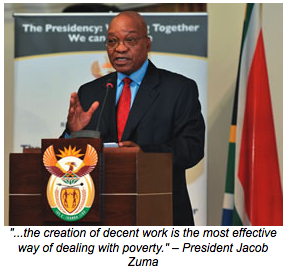 Industry leaders of Business Unity South Africa (BUSA), the banking and mining sectors and all the major parastatals were among the representatives who attended the summit.
Industry leaders of Business Unity South Africa (BUSA), the banking and mining sectors and all the major parastatals were among the representatives who attended the summit.
They discussed the growing need to find solutions to the unemployment challenge facing the country. These include working closely with the private sector to meet job creation targets.
Government has made substantial progress in transforming the economy to benefit the majority since 1994, but there are still serious challenges regarding unemployment, poverty and inequality, President Zuma said.
Workable solutions
He confirmed that there has been a long period of economic growth in the country during the past 10 years, but admitted that job creation lagged behind. He emphasised the importance of co-operation between business leaders and government to find workable solutions.
Zuma said the State has been doing its part to ease poverty through various social security programmes for the poor. “But the creation of decent work is the most effective way of dealing with poverty,” he said.
Private sector
“This calls for hard work from all sides. As government, we have been working to strengthen the legislative and policy frameworks to make it easier to do business in our country and to support emerging business, as well as broad-based black economic empowerment,” he said.
Solutions discussed at the summit, included ways in which government and the private sector could use the signs of positive economic growth to create employment. According to businessman and former Eskom chair, Bobby Godsell, we need practical solutions. “Coming together like this will help get the sense of how people think and what should be done both from the business side and from government.”
Dennis Dykes of Nedbank, said the role of the banking sector and its capacity to fund small business was important for any job creation strategy. He added that he hoped the summit would lead to banks playing a major role in growing business, especially small businesses.
Business council
BUSA decided to form a joint presidential business council, which would meet regularly to discuss issues of policy and how to advise government. “We have already partnered in the fight against corruption and crime and together with other social partners, this summit must also have a legacy,” said BUSA president, Futhi Mtoba.
Letters to the Editor - Give us a piece of your mind
Letters to the Editor - Give us a piece of your mind sadminWinning letter - Crime is our nightmare
 Crime is one of the greatest nightmares our nation faces every day. It’s sad that most of us turn a blind eye on incidents of crime. But ignoring crime only lasts until you or your loved ones become the victims of crime.
Crime is one of the greatest nightmares our nation faces every day. It’s sad that most of us turn a blind eye on incidents of crime. But ignoring crime only lasts until you or your loved ones become the victims of crime.
Fighting crime needs our collective efforts. The authorities keep saying that crime is decreasing, but to us on the ground it’s getting out of hand. We are no longer safe even in our homes. That is why we must blow the whistle when we see a crime incident.
If we fold our arms, we are only nurturing crime. By protecting each other and each other’s properties we will be working towards a crime-free society. –
- Matome Kubu, Tshwane, Gauteng
Respect is earned
Respect is not about material things; it is a two-way thing. When you show respect to other people, you will get respect – you give and you get. When you show respect, people will be willing to help you when you are in trouble. Respect opens doors for you, it helps you to network and make more friends.
– Thando Dinge, Port Elizabeth, Eastern Cape
Create your own jobs
Instead of always pointing fingers, we should be part of the solutions. We all want decent jobs, but who must provide those jobs? We can’t expect government to do everything for us, so let’s all contribute to the economy by creating our own job opportunities. Waiting for government will not help if you’re not willing to get up and do things for yourself.
– Brian, Julesburg, Limpopo
Apply your knowledge
It is not the amount of knowledge you have that will uplift you, but how you apply the knowledge. It’s sad to see university, and college graduates doing nothing with their lives, because they can’t find jobs. Employment is not the only crucial factor for success. I would like to advise all unemployed graduates to use their skills, start a business, work hard; anything is possible if you really put your mind to it.
– Samkele Masondo, Newcastle, KwaZulu-Natal
You helped me to learn
It’s not easy to survive in a new environment where everything is unfamiliar – school, teachers, neighbours and friends. The most difficult thing is learning a new language. I’m a Pedi girl from Limpopo who moved with my family to North West. I had to change from Sepedi to Setswana. With the help of Vuk’uzenzele, I learned it easily by reading the Setswana edition of the magazine. In matric I received an award for being the best learner in Setswana language. In my final exam I passed Setswana with a B symbol thanks to Vuk’uzenzele.
– Lerato Tladi, Mphahlele, Limpopo
Send your letters to:
Vuk'uzenzele, Private Bag X745, Pretoria, 0001, or e-mail: vukuzenzele@gcis.gov.za.
If you don’t want your real name published you may use a different name, but please include your real name and address.
Please note:
To win a prize you must include a physical address and a contact telephone number.
Prizes that re not claimed within 90 days of publication, will be forfeited.
Get tested
Get tested sadminMore than six million South Africans have been tested so far during the HIV Counselling and Testing (HCT) campaign. The campaign was launched by President Jacob Zuma in April last year. Its main aim is to promote HIV counselling and testing by encouraging all South Africans to know their status and to be screened for HIV, as well as TB. The goal is to test 15 million people by June this year.
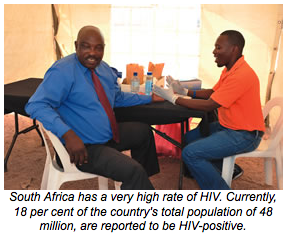 The HCT campaign forms part of government’s new and improved HIV and AIDS prevention and treatment plan. President Jacob Zuma not only made a call to all South Africans to know their HIV status, but had himself tested as well.
The HCT campaign forms part of government’s new and improved HIV and AIDS prevention and treatment plan. President Jacob Zuma not only made a call to all South Africans to know their HIV status, but had himself tested as well.
The campaign encourages people to continue getting tested, even after the campaign has ended.
Prevention
The main objectives of the new improved prevention plan are to substantially reduce the rate of infection and to provide ARV treatment to at least 80 percent of those who need it.
The new plan prioritises prevention through information, education, widespread distribution of condoms and mobilisation of millions of South Africans to know their status. Since the launch of the HCT campaign, employees at The Presidency and various other government departments have also been tested.
Mobile HCT services were rolled out at many hostels, clinics, shopping malls, informal settlements, taxi ranks and community gatherings, as well as rural areas with limited access to health facilities. The testing included screening for other health conditions such as high blood pressure and diabetes.
Farms and villages
This year, the campaign extended its testing to universities. It will eventually be rolled out at schools, farms and villages, as well as major factories and industries like mining.
Joining in the testing campaign, more than 2 000 workers at the Eskom Medupi Power station in Lephalale, Limpopo underwent testing in March.
The three-day testing campaign was a partnership between the Department of Health, the construction company Murray and Roberts and Eskom.
Circumcision
Other preventative measures have also been put into place, including widespread condom distribution, male medical circumcision and early treatment of sexually transmitted infections (STIs).
Male medical circumcision is an effective way of preventing the spread of HIV. Last year, all nine provinces promoted and conducted male medical circumcision, with KwaZulu-Natal taking the lead. Since the launch in April last year, the department has conducted 17 000 circumcisions. The circumcision campaign also focuses on counselling of young men. They are educated and informed about traditional advice, as well as HIV and AIDS and on male and female sexuality.
Condoms
As a further measure to curb the disease, the Health Department has increased access to condoms. By the end of December last year, it distrubted almost 500 million male, as well as female condoms.
The department is also developing a policy for school-based HIV testing. South Africa has almost 12 million learners in more than 6 000 high schools. If all learners from the age of 12 were to be tested for HIV, the department would far exceed its target of testing 15 million South Africans by June.
First things first for an HIV-free society
First things first for an HIV-free society sadminGovernment has launched a new HIV counselling and testing campaign called First Things First. The campaign aims to encourage at least 15 million South Africans, including tertiary students, to get tested for HIV and know their status by June 2011. This lays the foundation for an HIV-free society.
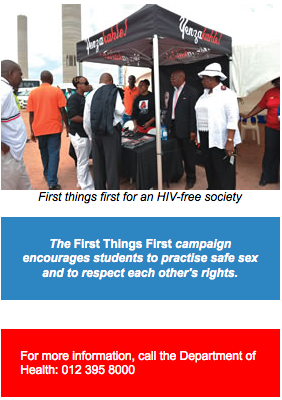 The First Things First campaign was launched at the University of the Witwatersrand (Wits) Medical School earlier this year. It is a collaborative effort between the South African National AIDS Council (SANAC), Innovative Medicines of South Africa (IMSA), the Foundation for Professional Development, the departments of health and higher education and the United States President's Emergency Plan for AIDS Relief (PEPFAR). It will be rolled out by the ministries of health and higher education and forms part of government's broader voluntary HIV testing and counselling (HTC) programme.
The First Things First campaign was launched at the University of the Witwatersrand (Wits) Medical School earlier this year. It is a collaborative effort between the South African National AIDS Council (SANAC), Innovative Medicines of South Africa (IMSA), the Foundation for Professional Development, the departments of health and higher education and the United States President's Emergency Plan for AIDS Relief (PEPFAR). It will be rolled out by the ministries of health and higher education and forms part of government's broader voluntary HIV testing and counselling (HTC) programme.
Campus visits
The campaign has already visited many tertiary institutions including the Wits Medical School Campus in Johannesburg and the Durban Institute of Technology (DUT). Campus visits will continue throughout the country this year and will be extended to reach every university's first-year orientation programme.
Future leaders
First Things First aims to help South African students, as future leaders, to be responsible, get tested for HIV, know their status and commit to behaviour that would benefit themselves and their peers," said Minister of Health Aaron Motsoaledi. "We chose to reach out to students as they are the future leaders who can enable positive change within society,"
“With this campaign we can put all our energy into making a significant contribution to government’s efforts by adopting a new approach,” he said.
According to Val Beaumont, Executive Director of IMSA, the campaign is one of the most ambitious in the world. “This is not just another campaign, it is fresh and it is contemporary. We are confident that it will leave a lasting behavioural legacy amongst students to do things differently.”
The departments of health and of higher education have ensured that mobile testing units will be stationed at 16 universities countrywide.
More than 250 staff members from the Foundation for Professional Development will be trained to carry out testing and counselling of students.
High schools
The HCT campaign is also expected to be rolled out at high schools soon. Respecting learners' privacy, tests will be performed in private spaces on school premises during weekends and school holidays.
Tackling the crime challenge with more resources
Tackling the crime challenge with more resources sadminMore than half of the crime incidents in South Africa take place in Gauteng. It is therefore fitting that more resources to tackle the crime challenge are made available to police in this province.
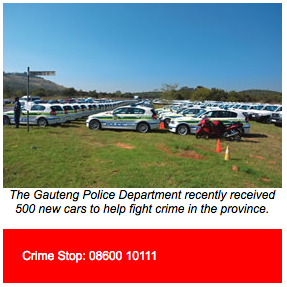 National Police Commissioner General Bheki Cele handed over more than 500 vehicles to Gauteng Police Commissioner Lieutenant-General Mzwandile Petros.
National Police Commissioner General Bheki Cele handed over more than 500 vehicles to Gauteng Police Commissioner Lieutenant-General Mzwandile Petros.
The hand-over ceremony was held at the Fountains Circle in Pretoria earlier this month and was attended by senior police officers.
Police visibility
General Cele said Gauteng was the province worst affected by crime but, with increased police visibility, the situation could be turned around.
In line with government’s focus on five key priorities, which include fighting crime, Cele said government wants to make sure that police did not have the excuse of not having cars when asked to help members of the public.
The 500 cars include top of the range high performance vehicles, as well as all-wheel drive vehicles for use by officers policing rural areas.
The vehicles will form part of the Gauteng Rural Safety Strategy as announced by Police Minister Nathi Mthethwa earlier this year during his meeting with farmers’ organisations.
Vehicle tracking
According to Cele, 67 of the new vehicles will be used solely for rural flying squad units in addition to the vehicles used for sector policing. Cele said police had an undertaking from the motor dealerships that the vehicles would receive priority during repairs to prevent police operations being delayed.
To prevent police from abusing vehicles, all the vehicles will be fitted with tracking devices to monitor their movements.
Other provinces
The Police Department spent a total of R135 million to buy the 500 vehicles. So far, 800 vehicles have been handed over to Gauteng police during the 2010/2011 financial year.
In January this year, Cele also handed over 300 vehicles including flying squad cars and unmarked vehicles for the detective services at a ceremony held in Hillbrow in Johannesburg.
About R1.1 billion has been reserved in the 2011/2012 financial year budget to buy new vehicles in other provinces as well.
Farming community
The farming community in Gauteng, which has become frustrated with the high incidence of crime aimed at its members, said it welcomed and supported this initiative. Community members said they hoped that the increase in vehicles would make a major contribution towards preventing crime in the province
Let's learn with Kha Ri Gude
Let's learn with Kha Ri Gude Estelle GreeffKha Ri Gude, which means “Let us Learn” in Tshivenda, is a mass literacy programme. It is aimed at teaching illiterate people older than 15 years to read, write and calculate in their mother tongues in line with the Unit Standards for ABET level 1. It also teaches them to speak English. Lessons are offered in all nine provinces and are available in all the official languages. They are also available in Braille and have been adapted for the deaf.
Themes
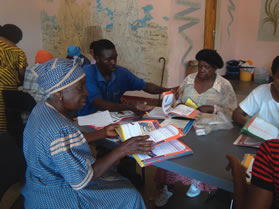 Different themes and life skills such as health, gender, the environment and education are integrated into the lessons.
Different themes and life skills such as health, gender, the environment and education are integrated into the lessons.
Kha Ri Gude classes are free and available to adults who have little or no education. Learners are required to attend classes for 240 hours. Classes are offered in communities, at times which suit the learners. They are held in homes, churches, community centres and even at prisons.
Targets
When the Kha Ri Gude literacy campaign was first launched in 2008, the rate of illiteracy in the country was estimated at 4,7 million. The targets of the campaign for 2008, 2009 and 2010 were to teach 360 000, 613 643 and 610 850 learners respectively. The campaign has had completion rates of over 90 per cent over these three years.
Workshops for co-ordinators will begin in April and Kha Ri Gude classes will start on 1 June.
For more information contact the Kha Ri Gude Call Centre: 0800 20 29 33 or visit www.kharigude.co.za or call the Department of Basic Education: 012 357 3000.
Expert tutors to help struggling schools
Expert tutors to help struggling schools Estelle GreeffSchools in Gauteng that have under-performed in last year’s matric exams are getting help from the provincial government through the expanded Secondary School Improvement Plan (SSIP). The plan, launched by the Gauteng Department of Education, includes Saturday classes by expert tutors.
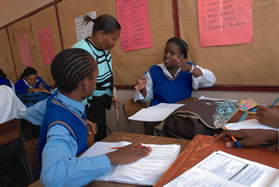 The SSIP aims to assist schools that achieved a pass rate of less than 80 per cent in the matric exams. The plan was launched at the Esokwazi Secondary School in Sebokeng and targets 51 000 Grade 12 learners in 391 schools throughout the province.
The SSIP aims to assist schools that achieved a pass rate of less than 80 per cent in the matric exams. The plan was launched at the Esokwazi Secondary School in Sebokeng and targets 51 000 Grade 12 learners in 391 schools throughout the province.
Gauteng Education MEC Barbara Creecy said the department increased the number of SSIP sites throughout the province this year from 94 to 109. Classes will be held every Saturday and during school holidays.
Expert tutors
More than 1 800 expert tutors have been employed to help Grade 12 learners. Students will be taught in Maths, Maths Literacy, Accounting, Physical Science, Life Science, History and Geography. Students studying Economics, Business Studies and English First Additional Language will get study material, as well as tuition in these subjects during the school holidays. As a result of the public sector strike last year, learners in schools across the country formed study groups to help catch up the work they missed.
These study groups played a major role in learner performance and encouraged learners to take greater responsibility for their own learning process. The department will now include self-study groups in the programme for the next three years and provide learners with study material.
Celebrities
In an effort to motivate learners to study consistently, celebrities such as sporting legends and motivational speakers, will visit the SSIP sites. Teachers from the SSIP schools will also receive training to ensure that the programme continues beyond the next three years.
Selected schools will carry out daily work in classrooms during the week, while SSIP lessons will be offered during weekends.
School districts will also monitor the programmes to identify, react to and resolve issues and problems faced by learners.
Drop-out rate
To target the high drop-out rate in the senior secondary schooling phase, the department is also offering tuition in Maths, Physical Science and Accounting to Grade 10 and 11 learners.
This programme will run during school holidays only and all Grade 10 and 11 learners are encouraged to participate.
Sweet returns from sugar-cane farming
Sweet returns from sugar-cane farming sadminIt has been a case of "sweet returns" for a KwaZulu-Natal North Coast farmer who ensured that his investment in a sugar cane farming business did not leave a bitter taste in the mouth. Although Joseph Mbuyazi only started leasing 187 hectares of land about three years ago, his Big Cedar Trading 250 sugar-cane farming business is growing rapidly.
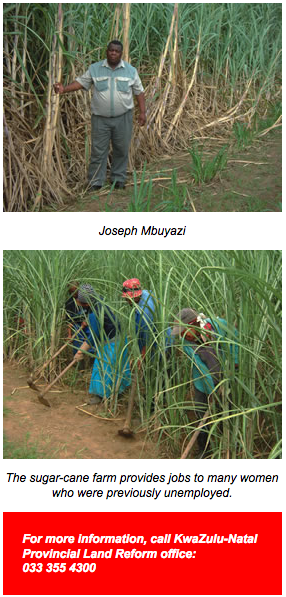 Mbuyazi grows sugar cane in the Monzi area near Mtubatuba outside St Lucia on the KwaZulu-Natal North Coast. Before he started leasing the present sugar cane farms, the 54-year old Khula Village resident had been a subsistence communal sugar cane farmer for more than 19 years.
Mbuyazi grows sugar cane in the Monzi area near Mtubatuba outside St Lucia on the KwaZulu-Natal North Coast. Before he started leasing the present sugar cane farms, the 54-year old Khula Village resident had been a subsistence communal sugar cane farmer for more than 19 years.
Success
“It is thanks to the Proactive Land Acquisition Strategy (PLAS) of the Rural Development and Land Reform Department that we have become successful farmers,” said Mbuyazi. Through the PLAS programme, the department bought the farm where Mbuyazi and nine other farmers worked in October 2008.
Loan
“I started in October 2008, but had to understudy the previous commercial owner during the harvesting period until December 2008. In 2009, I took control of the farm. I re-hired 36 farm workers,” he said.
“Most of the farms were lying bare and were unproductive. When I took over the farm it had eight farm workers’ compounds. I approached Ithala Development Finance Institution for a loan of R1,5 million and built 62 houses and workshops. I also bought implements and fertilizers, a Bell Loader, five tractors and seven trailers for crop production and transporting of sugar cane.”
Cane growers
Some of the previous commercial owners made offers to manage the farms, but the beneficiaries wanted to prove that they could do it on their own without mentoring. “I have been meeting my target of producing 18 000 tonnes per each harvest season,” Mbuyazi said proudly.
The Cane Growers Association and other stakeholders give ongoing support to ensure that they don’t fail.
The PLAS programme helps individuals, as well as groups that form a legal entity. It focuses on making sure that land bought by the State for land reform is used productively to ensure national food security.
Development
Government started PLAS to increase land redistribution and to ensure that the Department of Rural Development and Land Reform acquires land in those areas that had been identified for development and job creation.
With the pro-active strategy the department leases farms to emergent black farmers for a minimum of three years. After the three-year lease period, the department gives the land to the farmers if the department finds that they have acquired the knowledge to farm the land productively.
As part of the loan agreement with the department, the beneficiaries pay six per cent of the total buying price as rent for three years.
On a growth path with cucumber
On a growth path with cucumber sadminThanks to the Department of Rural Development and Land Reform, as well as good neighbourliness and a willingness to learn, a group of former farm workers in Limpopo became successful cucumber farmers and their business is still growing.
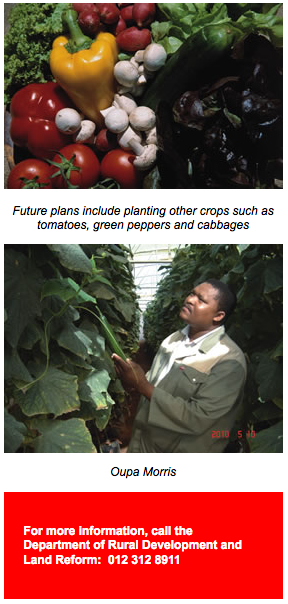 With the profits from the sales of cucumber, more than 16 former farm workers are able to support their families. This is possible thanks to government buying them the cucumber farm situated on 87 hectares of land.
With the profits from the sales of cucumber, more than 16 former farm workers are able to support their families. This is possible thanks to government buying them the cucumber farm situated on 87 hectares of land.
Land reform
The Department of Rural Development and Land Reform bought Xantium Farmers Trust at Doornfontein outside Modimolle (formerly Nylstroom) in Limpopo on behalf of the 16 present owners.
Managing Director, Mr Oupa Morris, said he and nine other workers used to work for the previous owner Mr Jan de Beer, who decided to sell the farm because of old age. They were given first preference to buy and approached the Limpopo Provincial Land Reform Office. The farm was then bought for R3, 6 million.
Tricky business
At the time of sale in October 2009, the farm had about 24 greenhouses or hydroponic tunnels where the cucumbers were grown. The new owners have since added six more hydroponic tunnels.
Each 10 metre by 30-metre tunnel houses about 720 cucumber seedlings. There are plans to increase the greenhouses to about 50 tunnels to enter the export market.
“Cucumber farming is a tricky business,” said Morris. “You must be on the farm 24 hours a day and there are many insects and diseases. Basically, every plant has to be nurtured like a baby,” he said jokingly.
Full-time workers
The majority of the owners of the cucumber farm are women. The number of full-time workers increased from the original 10 former farm workers to 16.
During harvesting, an extra 10 people are hired to assist with harvesting and packing. The farm also boasts its own borehole, a one-ton delivery bakkie and two tractors.
The delivery bakkie and the two tractors were bought from the profits they made after buying the farm.
Support from neighbours
Morris said the success of the cucumber farm his largely due to determination, and willingness to learn from neighbouring commercial farmers.
“The previous owner, De Beer, was very helpful when we were looking for funding to buy the farm. He also helped to identify the markets where we could sell our produce,” said Morris. “In fact, all the neighbouring commercial farmers have been supportive since we bought the farm.
Future plans
Other than supplying the Johannesburg Fresh Produce Market, they also supply a fruit and vegetable outlet in Bela Bela weekly with about 30 to 40 crates containing 30 cucumbers each.
Training chefs for tourism
Training chefs for tourism sadminFor many creative young South Africans, cooking is not only a hobby but a passion. For them, creating a mouth-watering dish is more than just cooking; it is a form of art. A group of 800 students are now getting a chance of a lifetime to realise their cooking passion and become qualified chefs. This is thanks to the National Department of Tourism's new National Youth Chefs' Training Programme in partnership with the South African Chef's Association.
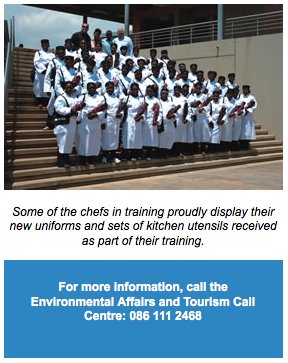 In line with government’s growth path, which is addressing unemployement, the tourism sector aims to create 225 000 jobs by 2015.
In line with government’s growth path, which is addressing unemployement, the tourism sector aims to create 225 000 jobs by 2015.
This will aso help to relieve the shortage of skilled chefs with the Department of Tourism’s chefs’ training programme. In partnership with the South African Chefs’ Association, the department will train 800 young chefs between the ages of 18 and 35 to become professional chefs.
Students must have a matric qualification, be unemployed and have a passion for cooking and the hospitality industry. R25 million will be invested into the new programme this year, with a further R5 million budgeted over the remainder of the programme.
Growth path
Tourism is one of the key drivers of economic growth in South Africa. It is also an important element of government’s growth path, which is aimed at addressing unemployment, inequality and poverty.
According to Tourism Minister Marthinus van Schalkwyk, the chef’s training progeamme covers a number of elements that are of particular importance to the continued growth and success of the tourism sector in South Africa.
Professional chefs
The project will be funded through the Expanded Public Works Programme (EPWP) initiatives. The programme will train students in all nine provinces from 2011 to 2013.
First phase
In the first phase of the project, the beneficiaries will be trained in the National Certificate of Professional Cookery, NQF 4. This qualification is recognised by all cookery and food-related sectors.
Second phase
In the second phase, students will receive training for a National Diploma of Professional Cookery, NQF 5. Thereafter, they will be placed with different hospitality establishments for an extensive training programme. On fulfilling all the requirements of the programme, the trainees will be registered as professional chefs by the South African Chefs’ Association.
Provinces
The number of students per province was influenced by provincial demand, the availability of training providers and the availability of placement for experiential learning.
The following number of students will be trained per province: Gauteng - 230, Limpopo - 30, Mpumalanga - 30, Northern Cape - 30, Eastern Cape - 60, Western Cape - 180, Kwazulu-Natal - 80, North West - 30 and Free State - 30.
Apply now for IDC funding
Apply now for IDC funding sadminThe Industrial Development Corporation (IDC) will step up its information campaign to encourage entrepreneurs to apply for available funding so that more jobs can be created this year.
The IDC is a development finance institution of the Economic Development Department. It is responsible for distributing government’s R10 billion Jobs Fund to deserving entrepreneurs.
So far, they have received only seven applications for funding from the Jobs Fund totalling R138 million. This could create around 750 jobs. The ideal is to create 40 000 to 50 000 jobs.
IDC Chief Executive Officer Geoffrey Qhena, said they were trying to address what was preventing entrepreneurs from applying for the funds.
“Ideally we can put in R2 billion every year, but there is no reason we can’t exceed that. If the uptake is such that we have to exceed one year and the other, we are not going to say now this year we have reached R2 billion. The whole point is to create jobs and the faster we create them the better,” he added.
For information on how to apply for IDC funding, call: 086 069 3888
Jobs: The Presidency
Jobs: The Presidency sadminAPPLICATIONS: The Presidency, Private Bag X1000, Pretoria, 0001 or hand deliver at 535 Proes Street, Arcadia, Pretoria.
FOR ATTENTION : Ms M Makgae
CLOSING DATE : 22 April 2011 at 16:30
NOTE : Applications must be submitted on form Z83 and should be accompanied by certified copies of qualifications as well as a comprehensive CV in order to be considered, It is the applicant’s responsibility to have foreign qualifications evaluated by the South African Qualification Authority (SAQA). Correspondence will be limited to successful candidates only. If you have not been contacted within three months after the closing date of this advertisement, please accept that your application was unsuccessful. Shortlisted candidates will be subjected to screening and security vetting to determine the suitability of a person for employment. Failure to submit the requested documents will result in your application not being considered. No faxed or e-mailed applications will be considered.
Post 13/57: Senior Legal Administration Officer (MR 6)
Chief Directorate: Legal and Executive Services
SALARY : Salary range between R260 421 basic notch (plus service bonus, employer’s contribution to pension and medical aid, housing allowance) – R632 976 (all inclusive remuneration package which already includes basic notch and employer’s contribution to pension and a flexible portion, that can be structured within the prescripts) per annum depending on experience and qualification as per the OSD determination.
CENTRE : Pretoria
REQUIREMENTS : B.Proc/LL.B degree At least eight years post-qualification experience, of which at least three years post-admission experience as an Attorney or Advocate experience in the interpretation and application of the law. Relevant experience in government. Knowledge and understanding of the Public Service legislative framework. Knowledge of South African Constitutional Law is imperative. Good communication (both written and verbal), as well as interpersonal skills. Well-developed analytical skills. The ability to perform research. The ability to work long hours and under pressure.
DUTIES : Ensure that President’s Acts and Minutes submitted for the President’s signature comply with necessary requirements regarding format and content. Research the legal content of Executive Acts submitted for President’s signature and advise thereon. Conduct research on the constitutionality and legality of Acts of Parliament, Proclamations and Regulations submitted for the President’s signature. Monitor parliamentary debates and advise thereon. Attend to all queries regarding the Executive Ethics Code. Administer and process international agreements. Communicate with relevant stakeholders on matters relating to Executive Acts of the President. Attend to queries and complaints from members of the public, as may be allocated from time to time. Ensure that government departments comply with the Manual on the Executive Acts of the President.
ENQUIRIES : Mr G Mphaphuli,Ttel: 012 300 5403.
Post 13/58: Legal Administrative Officer (MR1 - MR 5)
Chief Directorate: Legal and Executive Services
SALARY : Salary range between R108 030 basic notch (plus service bonus, employer’s contribution to Pension and Medical Aid, housing allowance) – R506,292 (all inclusive remuneration package which already includes basic notch and employer’s contribution to pension and a flexible portion, that can be structured within the prescripts) per annum depending on experience and qualification as per the OSD determination.
CENTRE : Pretoria
REQUIREMENTS : An appropriate three-year qualification in Law. Relevant experience in dealing with legal issues in a Government department will be an advantage. Computer and research skills. Good interpersonal and communications skills. Ability to work under pressure and travel when required.
DUTIES : Provide Legal support and conduct research on legal issues, scrutinize Acts of Parliament before assent by the President, liaise with Parliament as a Sessionary 39 Officer, process and scrutinize Executive Acts of the President, refer matters to Ministries for consideration, liaise with government departments with regard to Executive Acts of the President, coordinate responses when matters affect various government departments, consult on legal issues, provide comments on specific matters,
ENQUIRIES : Mr G Mphaphuli, Tel. 012 300 5403.
Jobs: Western Cape Provincial Government
Jobs: Western Cape Provincial Government sadminDepartment of Transport and Public Works
APPLICATIONS: Applications must be forwarded to Ayanda Mbanga Response Management, PO Box 833, Greenpoint 8051 or hand-delivered and placed in the PGWC Response Management Job Application box, located at the Foyer Entrance, Ground Floor, Dorp Street, Cape Town (attention Judy Johnstone).
Please note: Hand-delivered applications must be placed in a sealed envelope and clearly marked for the attention of Ayanda Mbanga Response Management. No registered mail must be sent to the hand-delivery address. PGWC is an equal opportunity employer.
FOR ATTENTION : Ms Judy Johnstone
CLOSING DATE : 6 May 2011
NOTE : How to apply: Z83 forms (obtainable from any government department) must: Be completed in full . Clearly reflect the reference number and/or name of the position . Be signed. Include a concise, three-page maximum, CV and the names of three recent referees and their e mail contact details, copies of ID, driver’s licence and highest qualification. Applications without the above will not be considered. CVs will not be returned. Candidates may be expected to undergo a behavioural and/or potential analysis, competency assessment and security clearance. Personnel Suitability Checks which includes criminal record checks, citizenship status, financial and asset record checking, credit checks, previous employment and qualification verification will be conducted on applicants as directed by the Department of Public Service and Administration. It will be expected of short-listed candidates to be available to undergo a competency assessment and selection interviews on a date and time as determined by the Department. If you have not heard from the PGWC within three months of the closing date, please regard your application as unsuccessful. The PGWC is an Equal Opportunity Employer.
Management Echelon
Post 13/90: Assistant Executive Manager - Strategic Planning, Integration and Coordination - Ref No U2/10/160
Strategy, Planning and co-ordination Branch
Job Purpose: To integrate and co-ordinate the development of Departmental Strategies and Plans.
SALARY : All inclusive remuneration package of R830 502.00 per annum (salary level 14)
Note: The remuneration package is flexible and comprises a basic salary, 13th cheque, car allowance, medical assistance and pension fund contribution. A portion of the remuneration package can be structured according to the individual’s personal needs.
CENTRE : Top Management post in Cape Town
REQUIRMENTS : Qualifications: Appropriate post-graduate degree
Experience: Extensive appropriate senior management experience (minimum of six years)
Competencies: 60.
Knowledge: Extensive knowledge, understanding and experience of the transport and public works sectors
- Knowledge of national and provincial regulatory environments.
- Experience in strategic planning and policy development.
- Extensive experience and knowledge of inter-governmental relations
- Human capital management experience.
- Financial management experience.
- Strategic leadership ability.
- Analytical and problem-solving skills.
- Conflict resolution skills.
- Excellent communication skills.
-
Management of diversity and change.
DUTIES: Key performance areas: Develop, manage and publish departmental strategic, transversal and integrated plans
- Manage provincial strategic issues within the Economic and Infrastructure Cluster where the department is the custodian
- Manage strategic and integrated departmental planning processes
- Manage the departmental monitoring and evaluation system
- Manage knowledge-management systems, inclusive of Enterprise Content Management and Programme and Project Management systems
- Manage the co-ordination of departmental strategic, transversal and integrated planning processes
- Manage the departmental involvement in provincial strategic objectives which the department supports.
ENQUIRIES : Ms J Gooch, Tel: 0214833013
NOTE : The incumbent will report to the Executive Manager: Strategy, Planning and Coordination and have a staff contingent of 4 Senior Managers and 1 Personal Assistant reporting directly and 10 Managers reporting indirectly. The individual who is successful in this position will play an integral role in leading the strategic direction of the department. The department has set high targets and requires strong individuals who are outcomes-focused and innovative thinkers to help it achieve the goals set.
Recycling helps fight poverty and crime
Recycling helps fight poverty and crime sadminA passion for making beautiful things from recycled cans has changed many lives in the community of Mandeni, a small town along the North Coast of KwaZulu-Natal. The man responsible for this positive change is 62-year-old crafter Muzi Mokoena.
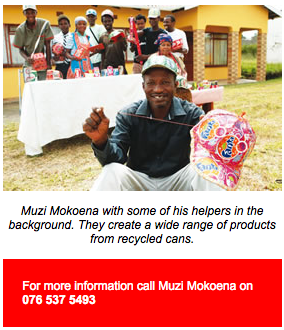 Muzi Mokoena had a dream to challenge poverty and crime within his community. All around him he saw children dropping out of school, begging on the side of the roads and even stealing to survive. This saddened him so much that he decided to make a difference.
Muzi Mokoena had a dream to challenge poverty and crime within his community. All around him he saw children dropping out of school, begging on the side of the roads and even stealing to survive. This saddened him so much that he decided to make a difference.
Arts and crafts
He started his own craft business called Muzi’s Arts and Crafts and has employed several young crafters from his community. He also encourages children from a young age to earn money by working hard instead of resorting to crime.
“People always blame government if they don’t have jobs or if things don’t work out. But what are we doing as citizens to meet government half way? We have skills and talents, but we do not use them.”
Muzi’s creative hands have led him a long way. He now makes 56 different products including office accessories, clothing and home decoration items and employs six people to help ease the workload.
Creative talents
His creative skills have allowed him to provide for himself and his family without relying on anyone. From a young age Muzi realized his creative talents. In primary school he started carving spoons out of wood and even made a rabbit out of soft stone.
After living in Cape Town and studying Craft Design and Enterprise at the Peninsula University of Technology, Muzi met his friend and business partner Luvuyo Nyathi. The two started their business, but after Luvuyo passed away, Muzi decided to move back home.
“I started small by making caps, belts and handbags out of recycled cans. I remember walking on foot trying to market my products. It wasn’t easy, but I believed in myself.” Soon after that, the African Art Centre in Florida Road, Durban and the Arts Africa Centre in Umhlanga decided to exhibit and sell his products.
Once the demand for his products grew, Muzi decided it was time to pass on his trade. He started involving the youth in his community.
Children as young as five years old started collecting cans for him and received 50 cents per can. Muzi began training the older teenagers, many of whom were high school dropouts.
Many adults in his community had lost their jobs due to factories closing down in the area after the global recession. He decided to help them and taught them how to craft. They were paid for every item they made. Today he has six junior crafters and a few freelance crafters working for him. He receives cans from children throughout the community.
“I am not only tackling poverty, I am also creating jobs, decreasing crime in my community and helping the environment by teaching people to recycle. I’m also instilling a work ethic and developing skills in each and every individual I come across.”
Grow and inspire
His business continues to grow and inspire others in the community. He supplies caps, belts, handbags, jewellery, vases, bread bins, dustbins and a wide range of office supplies.
Muzi’s Arts and crafts can be found at the Sangweni Tourism Centre in Ballito, African Art Centre in Florida Road, Durban, the KwaZulu-Natal Society of Arts in Glenwood, the Art Centre in Umhlanga and the African Art Centre in St Lucia. Some of his works also go to outlets in Midrand, the Western Cape and Port Elizabeth.
Calling retired engineers
Calling retired engineers sadminThe Department of Public Works is calling all retired and qualified engineers with experience in the field of engineering, construction or the built environment to submit their CVs to the department. The aim is to create a database of engineers and artisans who can help the department to train unqualified engineers and artisans to relieve the shortage of skilled artisans in South Africa.
Skilled artisans
The Department of Higher Education has indicated that 70 000 artisans will have to be trained within the next five years.
By doing this, government can deliver on its infrastructures promises, as well as job creation and skills development targets.
Workshops
The department has re-opened its workshops that have been out of operation. The workshops employed skilled people and helped government to deliver certain services. The closure of the workshops meant unemployment for many of these people. It also meant a loss of skills that are necessary to the development of the country.
Now that the departmental workshops are back in operation, apprentices will be trained to become qualified artisans.
Construction projects
Owing to the scarcity of artisan skills, government currently outsources most of the country's construction projects to large multinational and international corporations. If government can train more qualified engineers and artisans locally, it can use local people for such projects.
Qualified engineers and artisans who would like to be put on the database are urged to submit their CVs at the nearest regional office of the Department of Public Works or call the toll free number: 0800 782 542.
-
For your nearest Umsobomvu Youth Advisory Centre and information on JOBS, call the NYDA on: 011 651 7000
-
Seda Information Centre – 0860 103 703
-
For your nearest Labour Centre, call
012 309 4000
PLEASE NOTE: to apply for any government job, you will have to complete a Z83 form. You can find Z83 forms at any government or municipal office or at www.dpsa.gov.za. You will also need certified copies of your ID and relevant qualifications.
Jobs: North West Provincial Administration
Jobs: North West Provincial Administration sadminDepartment of Human Settlements, Public Safety and Liason
The North West Department of Human Settlements is an affirmative action employer with the intention of promoting representativity (race, gender and disability) through the filling of posts.
Applications : Completed applications should be forwarded to: The Director Human Resource Management: Department of Human Settlements, Private Bag x 2145 Mmabatho, 2735 or hand-delivered to Telkom Building, 3366 Besemmer Street, Industrial Site, Mahikeng (Behind the Crossing Shopping Complex).
For attention : Mr Mandla Khumalo NB
Closing date : Thursday, 21st April 2011
Note: Direction to applicants: Applications must be submitted on the prescribed form, Z83 (Fully completed) obtainable from any Public Service office and should be accompanied by the following documents: certified copies of qualificationS and identification document, a CV with competencies, experience and with full names, addresses and telephone numbers of at least three referees. Post number must be quoted as reference number. Applicants’ with foreign qualifications must submit a SAQA evaluation report on the qualification.
Applications should be forwarded in time to the department since applications received after the closing date indicated below will as a rule not be accepted. It will be expected of candidates to be available for interviews on a date, time and place as determined by the department. Post numbers must be used as reference numbers e.g. post 1. Failure to comply with the above requirements will result in the disqualification of the application. The department reserves the right not to make appointments & correspondence will only be limited to shortlisted candidates.
Post 13/82: Registry Clerk (1 Post)
Directorate: Information & Record Management
Job Purpose: Performs tasks associated with controlling the registering, recording, circulation and retrieval of documents and correspondence in accordance with laid down procedures directing applications associated with the registry and records functionality.
Salary: R113 568 per annum. Salary Level 06
Centre: Head Office, Mahikeng
Requirements : Grade 12 Certificate or equivalent qualification plus 1-2 years experience in records management and computer skills. Valid driver’s license. A three year elevant tertiary qualification (NQF Level 6) will be an advantage.
Knowledge: Knowledge of administrative and clerical procedures and systems such as word processing, managing files and records, designing forms and other office procedures and terminology
Duties: Provides access to information in the organisation. Maintains information system in the organisation, Monitors flow of records in the organisation, Submits reports on information input and output. Arrange and deliver unloading operations and ensure deliveries are signed for. Collect and dispatch mail to relevant officials.
Enquiries: Mr. M Tau, Tel: 0183910439
Closing date : Thursday, 21st April 2011
Post 13/83: Senior Administration Clerk (5 Posts)
Directorate: HRM & Development
Job Purpose: Monitor and perform a range of clerical and administrative tasks
Salary: R113 568 per annum. Salary Level 06
Centre: Head Office, Mahikeng
Requirements: A Senior Certificate or equivalent qualification plus 1-2 year experience in general administration and computer skills. A three year relevant tertiary qualification (NQF Level 6) will be an advantage.
Knowledge: Disciplinary knowledge in Public Administration. Knowledge of administrative and clerical procedures and systems such as word processing, managing files and records, designing forms and other office procedures and terminology. Knowledge of the procedures for receiving, responding to and managing requests/enquiries. Knowledge of the procedures for receiving, responding to and managing equests/enquiries. Knowledge of applicable legislative and regulatory requirements, policies and standards
Duties: Oversee the completion of standard forms based on information secured from source. Oversee and input/capture information into electronic information 55 management system to record and update non-financial or financial data. Records and resolves queries. Handles enquiries. Monitor the Maintenance and the updating of the filing system in accordance with standard operating procedures and legislative requirements. Sorts, opens and sends/distributes incoming and outgoing mail.
Enquiries: Ms. M Sebetlela, Tel: 0183910407.
Post 13/82: Senior Accounts Clerk (4 Posts)
Directorate: Finance
Job Purpose: Performs any combination of routine accounting procedures, maintain proper accounting records and obtain and provide financial information.
Salary: R113 568 per annum. Salary Level 06
Centre: Head Office, Mahikeng
Requirements: Grade 12 certificates or equivalent qualification plus 1-2 years experience in Financial Accounting/Accounting. Fundamentals and computer skills. Persal literacy in salaries administration. A three-year relevant tertiary qualification (NQF Level 6) will be an advantage.
Knowledge: Knowledge of communication skills. Knowledge of interpretation skills. Knowledge of interpersonal skills. Knowledge of the PERSAL System. Knowledge of problem-solving skills.
Duties: Ensure the capturing of payments and/or receipts on the accounting system PERSAL after verifying supporting documents for validity, accuracy and completeness. Utilises PERSAL to capture accounting transactions, perfrom financial administration and prepare financial reports. Ensure the capturing of claims after verifying for validity, accuracy and completeness. Responds to queries related to financial transactions. Reports on discrepancies between documents to be filed and transactions processed on the accounting system.
Enquiries: Ms. P Motsaathebe, Tel: 0183882972.
Post 13/82: Accounts Clerk (2 Posts)
Directorate: Finance
Job Purpose: Performs any combination of routine accounting procedures, maintain proper accounting records and obtain and provide financial information.
Salary: R79 104 per annum. Salary Level 04
Centre: Head Office, Mahikeng
Requirements: Grade 12 certificates plus 0-1 year experience in Financial Accounting/Accounting Fundamentals and computer skills. PERSAL literacy (salaries) and a three-year relevant tertiary qualification (NQF Level 6) will be an advantage.
Knowledge: Knowledge of communication skills. Knowledge of interpretation skills. Knowledge of interpersonal skills. Knowledge of problem solving skills.
Duties: Verify supporting documents for validity, accuracy and completeness before processing. Maintains and monitor Payroll. File stores, retrieve and safeguard source and face value documents. Responds to queries related to financial transactions. Perform any other administration duties as directed by the supervisor.
Enquiries: Ms. P Motsaathebe, Tel: 0183882972.
Get your ID!
Get your ID! sadminYouth matters
Home Affairs Minister, Dr Nkosazana Dlamini Zuma, has called on South Africans, especially the youth, to apply for IDs. This will give them the ability to register to vote in the 2011 Municipal Elections on 18 May.
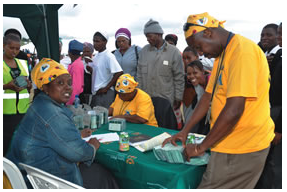 Thousands of South Africans flocked to register during voter registration weekend on 5 and 6 March. According to the Independent Elections Committee (IEC) over 653 000 young people under the age of 30 have either registered or re-registered to vote. The IEC has been targeting this age group ahead of the local government elections as part of its efforts to increase voter numbers.
Thousands of South Africans flocked to register during voter registration weekend on 5 and 6 March. According to the Independent Elections Committee (IEC) over 653 000 young people under the age of 30 have either registered or re-registered to vote. The IEC has been targeting this age group ahead of the local government elections as part of its efforts to increase voter numbers.
Voters' roll
The commission's chairperson Brigalia Bam said over 23 million people are now on the voters' roll. KwaZulu-Natal logged the highest number of new registrations followed by Gauteng and the Eastern Cape.
The IEC together with the Department of Home Affairs is committed to ensuring South Africans are issued with valid ID documents, so they can register to vote in Local Government Elections in May.
Parents also need to assist their children who are 16 years or older to apply for IDs.
What do I need to register?
To register, you must :
- be a South African citizen
- be at least 16 years or older
- have a green, bar-coded ID
Can I still register?
Voters who have not yet registered to vote can still do so at their local municipal offices.
What must I bring?
You need to register in person. Bring your South African, green, bar-coded ID book or a valid Temporary Identity Certificate (TIC) if you don't have an ID book.
How do I register?
- go to your voting station or Municipal Electoral Office
- fill in an Application for Registration as a Voter form
- your ID book will be scanned
- a bar-coded sticker will be pasted in your ID book.
When do I have to re-register?
You only have to re-register when your home address changes or when the IEC informs you that your voting district has changed.
How do I know if I'm already registered?
To check the status of your registration details, you can:
- SMS your ID number to 32810
- contact the call centre toll free on 0800 11 8000, or
- visit the IEC website at, www.elections.org.za
Towards free and fair elections
Towards free and fair elections sadmin2011 Municipal Elections
In preparation for the 2011 Municipal Elections due to take place on 18 May, the IEC hosted a pre-election summit in March.
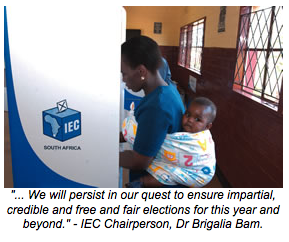 The 2011 Municipal Elections will be a challenge for the IEC as special voting has been allowed for the first time. This will be for people who are unable to vote in their voting districts on the day of the election.
The 2011 Municipal Elections will be a challenge for the IEC as special voting has been allowed for the first time. This will be for people who are unable to vote in their voting districts on the day of the election.
Special votes
Special votes will be cast on Monday 16 and Tuesday 17 May before election day on Wednesday 18 May.
Voters who want to cast special votes will have to apply at their nearest electoral office so that arrangements can be made ahead of time.
Special votes for Monday 16 May are for people who will not be at their voting districts on voting day due to the nature of their work. This includes police doing election duty and journalists. Once their applications for special votes had been approved, these people would be able to vote on Monday, 16 May.
On Tuesday, 17 May, the IEC will be handling special votes for people who are admitted to hospitals or are sick at home and cannot go to the voting stations on Wednesday, 18 May.
IEC officials will visit hospitals, homes for the aged and private homes to help these voters to cast their votes ahead of voting day 18 May.
During the municipal elections, different ballot papers are used depending on the type of municipality in which you live.
To vote in the municipal elections, you have to register as a voter in the voting district where you live and vote where you are registered.
There are three types of municipal councils:
- Metropolitan councils such as Tshwane, eThekwini and Ekurhuleni.
- District councils such as Alfred Nzo and uMgungundlovu district municipalities.
- Local municipalities like Mogale City and Polokwane local municipalities.
In some provinces there is a form of municipality called the District Management Area. These are normally found in areas such as game reserves or parks or nature conservation areas where there are too few people to form wards.
Ballot papers
On voting day, voters registered at a metropolitan council are issued with two ballot papers.
The first ballot paper is for proportional representation where the voter is expected to vote for the party of his or her choice. The second ballot paper is for the ward councillor or candidate.
However, voters registered within a Local Municipality are issued with three ballot papers.
The first ballot paper is for proportional representation (PR) where the voter is expected to vote for a party of his or her choice. The second ballot paper is for the ward candidate, while the third ballot paper is for proportional representation whereby the voter chooses his or her party of choice for the district municipality.
Registered voters
The two voter registration weekends of 5 to 6 February and 5 to 6 March increased the registered voters' roll to 23 600 000 voters. This falls just 400 000 short of the original IEC target of having 24 million voters registered. More women and young people than for the previous elections registered during the registration weekend in March. KwaZulu-Natal topped the list with the most registered voters at more than 200 000.
For more information, call the IEC National Office: 012 622 5700 To check your voting registration status, call the toll-free number: 0800 11 8000
Youth bring joy to a pensioner
Youth bring joy to a pensioner sadminYouth matters
A group of youths from the Driefontein community brought joy to a pensioner along the KwaZulu-Natal North Coast when they built him a new home.
A better life
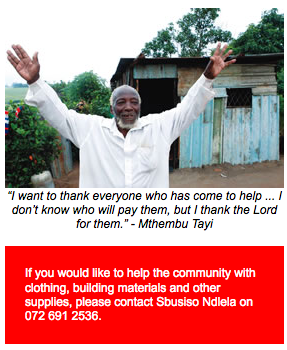 According to Driefontein Community Policing Forum chairperson, Sbusiso Ndlela, the home was built for Mthembu Tayi. Mthembu, who said he was the same age as Nelson Mandela and Oliver Tambo, used to live in a run-down shack and has no income.
According to Driefontein Community Policing Forum chairperson, Sbusiso Ndlela, the home was built for Mthembu Tayi. Mthembu, who said he was the same age as Nelson Mandela and Oliver Tambo, used to live in a run-down shack and has no income.
The youth responsible for building the house are members of the Thando Christian Church of Prophecy and Ukukhanya kweBhethesda Church in the area. They were sad to see an elderly man living in total poverty and decided to help him have a better life by building him a sturdy home with a stable roof. They used corrugated iron, because bricks were too expensive and they had limited resources.
Overjoyed
Mthembu was overjoyed and reduced to tears when he realised what the youth had done for him. “I want to thank everyone who has come to help. What is amazing is that I don’t even know some of the people who helped me. I don’t have money. I don’t know who will pay them, but I thank the Lord for them,” he said.
A helping hand to Japan
A helping hand to Japan sadminInternational relations
A devastating earthquake and tsunami hit Japan on 11 March. While the people of Japan continue to deal with the widespread damage, many countries across the world, including South Africa, have offered a helping hand. A search and rescue team of 50 specialists including doctors, paramedics and rescue dogs from South Africa were sent to help search for survivors.
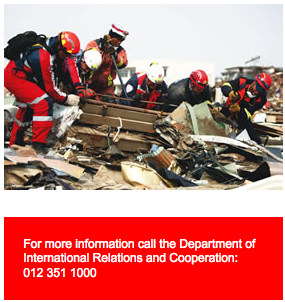 The Tsunami was caused by an earthquake measuring 9 on the Richter scale, which hit the island of Honshu in the northeast. Numerous people were killed or are missing and thousands were left homeless. Just four days after the disaster struck, an aftershock measuring 6.1 on the Richter scale shook Honshu again. The earthquake has damaged and washed out entire villages and towns. The South African rescue team falls under the International Search and Rescue Advisory Group (INSARAG), which co-ordinates rescue operations. The team along with their trained rescue dogs helped to pull survivors and bodies out of the rubble at Natori City, north of Tokyo. Inflatable boats were used to search the flooded rice paddies in freezing weather.
The Tsunami was caused by an earthquake measuring 9 on the Richter scale, which hit the island of Honshu in the northeast. Numerous people were killed or are missing and thousands were left homeless. Just four days after the disaster struck, an aftershock measuring 6.1 on the Richter scale shook Honshu again. The earthquake has damaged and washed out entire villages and towns. The South African rescue team falls under the International Search and Rescue Advisory Group (INSARAG), which co-ordinates rescue operations. The team along with their trained rescue dogs helped to pull survivors and bodies out of the rubble at Natori City, north of Tokyo. Inflatable boats were used to search the flooded rice paddies in freezing weather.
“The people of South Africa share the pain and loss of the loved ones, their homes and property, and our thoughts and prayers go to the affected families.” - President Jacob Zuma.
According to South Africa’s Department of International Relations and Cooperation, between 200 and 500 South Africans are said to have survived the earthquake and tsunami.
Equipment, food, medicine
The South Africa team carried about 16 tonnes of food, specialised equipment and camping gear. According to Rescue SA spokesperson, Ian Scher, the team needed about R7 million for the operation for its own camp, food, rescue equipment, medication and doctors.
The team received funding from government, NGOs and the private sector, including Netcare, Discovery, Econet Wireless, MTN and Core Group. Other organisations such as ER24 and Medhold sponsored medication.
Proud of team SA
Wallace Sellar, one of the rescuers who hails from the Cape Town Emergency Services, described his experience in Japan. “We had to conquer the weather elements. It was sad to see, but people worked hard to avoid being flattened and wiped out,” he said.
Wallace along with other rescuers worked in the field recovering bodies and helped recover seven bodies. He says his experience taught him to appreciate life and not take things for granted “because you can lose it all tomorrow.”
Rescue SA team leader Collin Deiner thanked South Africans for believing in the team, while Department of International Relations and Coorperation ambassador, Sisa Ngombane, expressed pride in the team. “We are very proud of team SA who answered the call of the Japanese. Japan saw your mark, thank you for all you sacrificed.”
Japanese ambassador Toshiro Ozawa said, “I told the team earlier that their assistance will be a symbol of friendship and solidarity. This team worked on the north eastern side where weather conditions were harsh. They were well prepared. Reports I received on the ground about them were full of praise.”
A total of 50 nations have pledged relief support and more than 70 specialist rescue services from around the globe, including South Africa, were sent to Japan.
Donate money
South Africans have been urged to donate money to assist the South African rescue team in Japan with equipment and other resources.
The money raised will go towards more equipment, better camping gear and other additional resources towards Rescue SA’s mission.
You can donate the money using your cellphone. Send an SMS with the word Japan to 36585 to donate R5.
Meaning of words
Earthquake: Underground movement along a fault plane resulting in shaking and vibration at the surface of the earth.
Richter scale: A scale used to measure the relative strength of earthquakes. It rates earth tremors on a scale from 1 to 9. A figure of 2 or less is almost unnoticeable, whereas an earthquake measuring over 5 may be destructive, and 8 or 9, is a major earthquake.
Tsunami: A very large wave or series of waves in the ocean caused by an underwater earthquake or volcanic eruption. It often causes extreme destruction when it strikes land.
Building BRICS
Building BRICS sadminInternational relations
Brazil, Russia, India and China are the four biggest economies in the developing world. They account for 40 per cent of the world’s total foreign exchange reserves and represent over 4 per cent of the world’s population. In 2009, the leaders of Brazil, Russia, India and China met for the first time in Russia to form an economic and political partnership called BRIC from the first letters of the member countries’ names.
South Africa
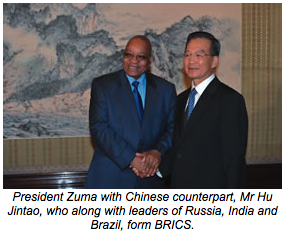 In December 2010, South Africa received membership of this group, and the name changed to BRICS.
In December 2010, South Africa received membership of this group, and the name changed to BRICS.
In April this year, President Jacob Zuma will meet with leaders of the BRICS nations at the 3rd BRICS Leaders Summit in Beijing China.
The flow of trade and investment in the BRICS countries are undergoing great transformation. Member countries are now global investors, because their economies were able to overcome the global financial crisis and have become a source of stability to the global economy.
Why did South Africa join?
BRICS is a platform to represent the voices of the emerging/developing markets. South Africa is seen as a gateway to the African continent, which will help to transform our country, our continent and the world for the better.
South Africa stands to benefit tremendously from BRICS projects in areas such as agriculture, science, statistics, development of finance institutions, security and justice.
Women, children and people with disabilities
Women, children and people with disabilities sadminKnow your Minister
The Department of Women, Children and Persons with Disabilities (DWCPD) was established in May 2009. The Minister is Ms Lulu Xingwana.
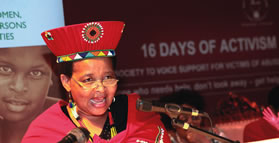 When the announced the new department, President Zuma said the creation of the department was part of government’s renewed focus on doing things differently.
When the announced the new department, President Zuma said the creation of the department was part of government’s renewed focus on doing things differently.
The department replaced the Office of the Status of Women, People with Disabilities, Youth and Children located within the Presidency. The new department works closely with similar sections in the offices of the premiers in the nine provincial governments.
Neglected groups
The department is headed by a director-general and three deputy directors-general each responsible for the portfolios of Women, Children and People with Disabilities.
The purpose of the DWCPD is to drive government’s programme on employment equity, equality and empowerment agenda with regarding neglected groups and historically disadvantaged communities in each of the three sectors.
The department’s mission is to create an enabling environment so that government can monitor and evaluate the carrying out of the three group’s rights as set out in the Constitution.
Goals for gender equality
The DWCPD also aims to assist public-funded institutions, organs of civil society, state-owned enterprises and the private sector to achieve national and global goals for gender equality and the rights of children and persons with disabilities.
The department emphasises the need for equity and access to devel-opment opportunities for vulner-able groups in South African.
Minister Lulu Xingwana
Born in September 1955 in the Eastern Cape, Minister Xingwana has been involved in women development and empowerment activities during most of her adult life.
She has been a Member of Parliament since the inaugural democratic elections of April 1994. She has been and continues to be an active member of the Women’s League of the African National Congress (ANC).
Before her appointment to her present portfolio in November last year, Minister Xingwana was Minister of Arts and Culture from May 2009. Between 2006 and 2009, she was the Minister of Agriculture and Land Affairs now called Rural Development and Land Reform.
For more information, call the Department of Women, Children and People with Disabilities on: 012 308 1776 Pretoria or 021 469 8306 Cape Town
Realising our children's rights
Realising our children's rights sadminKnow your Minister
"We need to work together as various spheres of government, civil society, research institutions and development partners towards the realisation of the rights of all our children. As a department, we will do our part to ensure that these engagements take place regularly and that they guide our country on issues of children's rights," said Minister Lulu Xingwana at a meeting of the National Children's Rights Advisory Council held in Pretoria recently.
 Government has undertaken to work with non-governmental organisations to promote children’s rights and end child labour practices. Women, Children and People with Disabilities Minister Lulu Xingwana made this commitment during her keynote address at a recent meeting of the National Children’s Rights Advisory Council in Pretoria.
Government has undertaken to work with non-governmental organisations to promote children’s rights and end child labour practices. Women, Children and People with Disabilities Minister Lulu Xingwana made this commitment during her keynote address at a recent meeting of the National Children’s Rights Advisory Council in Pretoria.
Minister Xingwana said in terms of the Basic Conditions of Employment Act it is a criminal offence to employ a child younger than 15 years. Children aged 15 to 18 years may also not be employed to do work not suitable for their ages or work that would put them at risk.
Children's Act
United Nations agencies, children’s rights groups and other organisations involved in children’s right also attended the National Children’s Rights Advisory Council.
During the meeting, Minister Xingwana reported on the progress made in implementing the Children’s Act and Child Justice Act. These two Acts came into operation last year and they are aimed at protecting the rights of children in South Africa.
The Children’s Act provides for the protection of different rights of children. The purpose of the Child Justice Act, among others, is to provide better ways of dealing with children in conflict with the law.
Agricultural sector
Minister Xingwana noted that most child labour practises take place in the agricultural sector. “Most of these children work as unpaid family members,” she said.
She said the department needed the co-operation of the communities to report cases of child labour to the authorities.
Migrant children
Projects that the department has been involved in include the plight of unaccompanied migrant children in the Musina area near South Africa’s Beitbridge border post with Zimbabwe.
The project is funded by the Italian government. The non-governmental organisation, Save the Children, also supports the project by helping to protect the children.
The project ensured that unaccompanied migrant children were registered and had access to temporary shelter.
It also ensured that the children received support and advice on how they could return to their countries of origin and re-unite with their families.
Thank you, Mr President
Thank you, Mr President sadminPresidential Hotline
Removed from the attention of the media spotlight, the Presidential Hotline continues to be a source of hope for many South Africans and non-South Africans alike in their day-to-day dealing with the different levels of government.
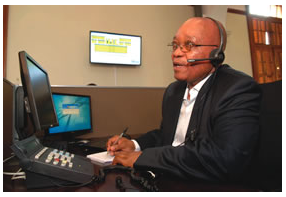 The Presidential Hotline has been in operation for only 18 months, but has already proved to be a successful demonstration of what government meant when it said it wanted to do things differently and smarter.
The Presidential Hotline has been in operation for only 18 months, but has already proved to be a successful demonstration of what government meant when it said it wanted to do things differently and smarter.
The Presidential Hotline changed the widely-held public perception of government services. Many people who have benefited after contacting the hotline have praised the efficient way in which it has helped to solve their problems.
School
Early this year, a Congolese widow, Noella Kazadi asked the Presidential Hotline to help secure places for her two children at a Cape Town primary school.
Kazadi came to South Africa in December last year after the death of her husband. She stayed with relatives in Heathfield, Cape Town. Because the children, a 10-year old boy and a 12-year old girl, speak French, none of the schools in the area could accommodate them as the medium of instruction in most schools is English.
On 26 January, the family approached the Presidential Hotline for help. The Hotline asked Heathfield Primary School Principal, Mr Andre Pretorius to admit the children and they started school on Monday 31 January 2011. The Kazadi family is very grateful that the hotline helped to solve their problem within only three days. The 10-year old boy, Jay Shutcha, wrote a letter to thank President Zuma for what the President had done for him and his sister.
Happy again
“When my mother told me we were going to South Africa, I was very sad,” he wrote. “When we arrived in Cape Town, my mother and my uncle told me that it was too late to be paced in a school. I was crying everyday and my mother too. Then my uncle said we are going to ask Mr Zuma the President to do something. I did not believe in it as I do not believe in Father Christmas. But today I am happy again and I am happy to be in South Africa,” wrote the Congolese boy.
University student
The Presidential Hotline also helped secure accommodation and tuition fees for an Analytical Chemistry student at teh Cape Peninsula University of Technology, Onke Tomose. He used to walk eight kilometres from his shack situated in an informal settlement to the university.
Many people who have benefited after contacting the hotline have praised the efficient way in which it has helped to solve their problems.
Tomose is originally from Idutywa in the Eastern Cape. He registered for the National Diploma in Analytical Chemistry from his savings from the time he worked at a margarine factory. Both his parents are old and unemployed.
Tomose’s lecturer, Dr BJ Ximba realised that he didn’t get financial assistance and accommodation. Dr Ximba approached the Hotline. Ms Dudu Fakudze, the Director of the Public Liaison Unit under which the Presidential Hotline falls, then approached two prominent black businesswomen, Mrs Manana Nhlanhla and Mrs Hixonia Nyasulu for financial assistance.
The two businesswomen responded positively and provided financial assistance to Tomose. The National Student Financial Aid Scheme (NSFAS) is now paying fees for tuition and accommodation on campus for Tomose.
Evicted family
A Pretoria resident, Ms Saroj Govender, who was one of the first citizens to ask for help when the Hotline was started is all smiles today.
In 2006, Govender and her family was evicted from their home under unclear conditions at Hercules in Pretoria where they were living with their seven-year old son. After they were evicted, they approached government departments for help, but they were sent from pillar to post with promises of help never being honoured.
When they heard about the Presidential Hotline, they saw it as the only solution to their three years of suffering with nowhere to stay. It took the hotline’s persuasive methods of getting responses from the government departments and to get them to deliver on the promises previously made.
The Presidential Hotline made provisional arrangements in terms of shelter and food as the need arose and constantly gave emotional support. The family has now received a home on some land which is used for farming.
Hope
The cases above are only some of the many that show how the hotline has brought hope to many people who tried to get help without success.
Hotline number: 17737 (1 PRES)
Fax: 086 681 0987/ 012 323 8246
E-mail: president@po.gov.za
Other dedicated customer care lines
Other dedicated customer care lines sadminPresidential Hotline
The Presidential Hotline 17737 should only be used when all your attempts to get assistance from a government department, province, municipality or state agency have failed. However, the hotline is not only a complaints line. You can also call to share your views or provide solutions to the challenges in your community.
Other government departments also have dedicated customer care hotlines for information, lodging complaints about service delivery and enquiries.
Some of these numbers - those that start with 0800 are toll-free, which means you don’t pay for the call. If you dial any of the numbers that start with 086, you share the cost of the call with the company or department whose number you dialled. The remaining numbers - those starting with an area code - are landline numbers for which you pay.
- Anti-corruption Hotline (national, provincial and municipal levels): 0800 701 701
- Department of Basic Education: 0800 202 933
- Department of Defence and Military Veterans toll-free Crime Line: 0800 222 091
- Department of Environmental Affairs: 086 111 2468 or e-mail callcentre@environment.gov.za
- Childhood Cancer Foundation of SA: 086 111 3500
- Aids Helpline: 0800 012 322
- Department of Home Affairs: General enquiries: identity documents and travel documents: 0800 60 11 90
- Department of Human Settlements: 0800 14 68 73
- Department of International Relations and Cooperation after-hours helpline: 012 351 1000
- Independent Complaints Directorate (for complaints against police conduct): 012 399 0000 or e-mail: complaints@icd.gov.za
- Department of Public Works: 0800 782 542 (for now this dedicated to retired engineers and artisans to contact the Department)
- Department of Rural Development and Land Reform Eviction toll-free line: 0800 00 70 95
- Gateway Call Centre for general inquiries about government services: 1020
Making Fridays magnificent
Making Fridays magnificent sadminSport and Recreation
South Africans from all walks of life, young and old have swapped their Football Fridays for Magnificent Fridays. Responding to calls from the Department of Arts and Culture, as well as Sport and Recreation South Africa to support our national sports teams, people are encouraged to wear the colours and shirts of our national teams, sing the national anthem and fly the national flag high every Friday.
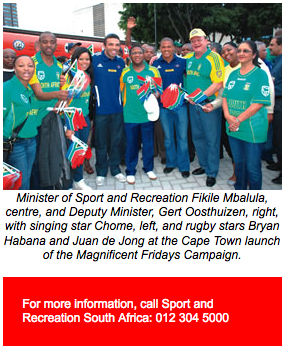 South Africans, still smarting from the successful hosting of the 2010 FIFA World Cup, are once again coming out in numbers to support the country’s three national teams taking part in world sporting events this year.
South Africans, still smarting from the successful hosting of the 2010 FIFA World Cup, are once again coming out in numbers to support the country’s three national teams taking part in world sporting events this year.
These events include the 2011 Cricket World Cup, the 2011 Netball World Championships in Singapore in July and the 2011 Rugby World Cup in New Zealand in September/October.
After the Cricket World Cup, the Magnificent Friday campaign will encourage South Africans to support “Amantombazane” - the girls of the national netball team who will be participating in the 2011 World Netball Championships in Singapore in July.
After the netball, South Africans will be encouraged to support the Springbok rugby team before and during their participation in the 2011 Rugby World Cup in New Zealand.
The Magnificent Fridays campaign will also include activities such as educating communities about our national symbols, singing the national anthem, distributing national flags and presenting sports clinics.
National symbols
To show heir commitment and creating awareness about national symbols, Ministers, Provincial Premiers and MECs responsible for Arts and Culture, Sports and Recreation, will participate at events to install and raise national flags at selected schools.
Activities to raise awareness of Magnificent Fridays also include raising awareness about national orders and symbols. Flags, booklets and other relevant material will be distributed to the public.
Activities furthermore include demonstrations and coaching clinics in cricket, rugby and netball, as well as performances by various artists and music groups to encourage people to support the three national teams.
National netball, rugby and cricket teams and sports -legends will also attend events.
Magnificent Fridays aims to fire up the entire nation to stand behind their sports teams and help them achieve their best in 2011 international tournaments.
Sport in schools for better citizens
Sport in schools for better citizens sadminSport and Recreation
To ensure that learners get a balanced education by developing both their physical and creative abilities, physical education will be re-introduced as a stand-alone subject in schools.
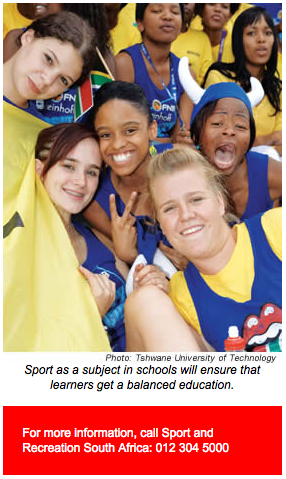 Government believes that the re-introduction of physical education will lead to well-rounded young people who become better citizens. It will also be supportive of the 1GOAL campaign. 1GOAL was launched in 2009 to “seize the power of football”. The aim was to ensure that education for all was a lasting legacy of the 2010 World Cup.
Government believes that the re-introduction of physical education will lead to well-rounded young people who become better citizens. It will also be supportive of the 1GOAL campaign. 1GOAL was launched in 2009 to “seize the power of football”. The aim was to ensure that education for all was a lasting legacy of the 2010 World Cup.
Better citizens
During a three-day South African Sport and Recreation Conference held in Durban in August last year, it was noted that the re-introduction of physical education as a subject in schools would lead to better citizens.
In addition, the conference also noted that if learners became involved in sports at school, sport federations and community clubs would have a steady and constant supply of quality athletes.
Government will re-introduce it as a stand-alone subject with its own dedicated time. Some provinces have already started re-introducing physical education as a subject this year. During the State of the Province Address in February, Gauteng Premier Nomvula Mokonyane said that quality education did not only refer to young people who could read, write and think on their feet, it also included the development of the learners’ physical well-being.
Sports days
Starting this month, Wednesday afternoons will be sports days in all public schools in Gauteng. A Gauteng schools sports tournament will also be launched with the help of the provincial departments of education, sports, arts, culture and recreation. “We will increase the involvement of schools in the School Sport Mass Participation Programme from 350 to 470 in April this year,” said Mokonyane.
Mass participation
The re-introduction of Physical Education as a stand-alone subject requires certain basic requirements such as trained physical education teacher.
The participation of women is another important issue that will be addressed within sport circles in line with government’s policy of empowering women.